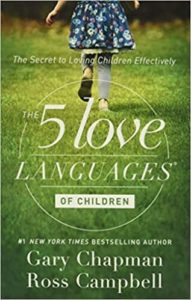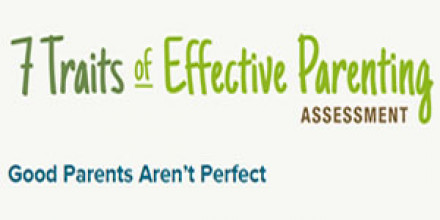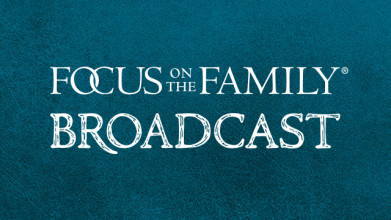Sponsor ID: This program is sponsored by Focus on the Family, helping families thrive in Christ for over 40 years.
Preview:
Dr. Gary Chapman: Words of affirmation, acts of service, quality time, physical touch, and gifts, receiving gifts.
John Fuller: That’s Dr. Gary Chapman sharing about learning your child’s love language. And he’s here with us suggesting that while most parents do love their children and do want their children to feel loved, uh, few of us know how to effectively communicate those feelings. Uh, you’ll get some help with that today. This is Focus on the Family with your host Focus president Jim Daly, and I’m John Fuller.
Jim Daly: John we’ve shared many times on the broadcast that parenting is tough work, and it is. And we want…
John: Rewarding, but tough.
Jim: Yeah, absolutely. And it’s great to have Dr. Gary Chapman back with us, along with my wife, Jean, I’m always thrilled when she’s here with us to give that mom perspective. Uh, but Gary is the author of the bestselling book, The Five Love Languages, which is sold, I think more than 14 million copies.
John: Wow.
Jim: Uh, it resonates (laughs) and, uh, he’s taken those concepts from that book and applied them to parenting, helping us to know better how to love our kids through their love language. And I’m looking forward to the discussion today.
John: And a lot of the content is in Gary’s book, The Five Love Languages of Children. We’ve got copies of that here. Just call 800, the letter A, and the word family, or stop by focusonthefamily.com/broadcast. In addition to being a writer, uh, Gary’s a pastor, a counselor, and, uh, he and his wife Carolyn have been married for over 50 years. They have two grown children.
Jim: Gary, welcome back.
Dr. Chapman: Thank you. It’s great to be back.
Jim: It’s always good to have you. Jean, welcome into the studio.
Jean Daly: Well, thank you. (laughs) It’s always a pleasure being here.
Jim: It is. It’s a pleasure having you, obviously. Uh, but Gary, let’s get going on this. Uh, I’m, I’m excited about helping parents do the best job they can do. And you know, it’s a tough task like we talked about. How do we, as parents often fall short in expressing our heartfelt love for our kids, even though they’re frustrating us? (laughs)
Dr. Chapman: Well, you know, Jim, I think that most parents are sincere, and I think most parents love their children, but the children don’t always feel loved.
Jim: Mm-hmm.
Dr. Chapman: And we recognize that one of the deepest emotional needs that a child has is the need to feel loved by the significant people in their lives. And the parents are the most significant people in their lives. Uh, I’ve sometimes said, uh, in every child there’s an emotional love tank, you know, and if the love tank is full, the child grows up emotionally healthy. If the love tank is empty and the child feels like they don’t love me, they grow up with a lot of internal emotional struggles. And in the teenage years, they will often go looking for love typically in the wrong places. So, uh, I’m, in this book, I’m trying to help parents realize that sincerity is not enough, we gotta learn how to communicate love to each individual child. And what makes one child feel love will not necessarily make another child feel loved.
Jim: Right. It’s so true. Uh, you know, and parents come into this with their own baggage. I mean, we don’t get a manual from the hospital that says, here’s how you parent, that would be a good thing. (laughs) Maybe Focus should develop that. But, uh, but the point of that is, you know, we bring our own scars, our own wounds into this and temperaments are different. Uh, you know, Jean is kind of the black and white thinker in our relationship, and, and I think for me, uh, I’m probably I lean a little more into the relationship. What do you think Jean?
Jean: Oh, definitely. Sure.
Jim: Yeah. And so in that context though, how can we learn to be, um, intentional about filling the tank when we have our own deficits?
Dr. Chapman: Yeah, well, we, we all have a history that we didn’t choose, and then some of our history we did choose (laughs) and we made poor decisions along the way. And so sometimes I think the beginning place for a parent, if they realize, yeah, I don’t know that I’m doing a really good job with this parenting thing maybe is to ask, you know, somebody else, you know, how, what do you think? And, and maybe there’s a place to apologize to children and to say, “You know, I realize I, I haven’t been doing this or that or whatever, you know, and I just… I wanna ask you to forgive me. I wanna be a better parent and I’m trying to be a better parent.” So if we realize that we are all in process, none of us are perfect parents and you don’t have to be a perfect parent to have healthy children. We do have to deal with our failures and that’s where apologizing to the child and let the child forgive us. We’re teaching them a real skill because they’re gonna have to learn to apologize too somewhere along the line.
Jim: Yeah. In the book you, you say that saying, I love you isn’t enough.
Dr. Chapman: Yeah.
Jim: I probably err, in that side, I’d say a lot of, I love you’s, but I don’t know that I go the extra mile. Describe what that extra mile should look like.
Dr. Chapman: Well, I think, uh, whatever we grew up with is probably what we do, or whatever makes us feel loved is what we tend to do for the other person.
Jim: Can you give me an example?
Dr. Chapman: Well, if words of affirmation is my love language, if that’s what makes me feel loved, then I’ll probably give much high words of affirmation. I’ll tell them how great they’re doing on sports. I’ll tell them how wonderful, um, how proud I’m. If they made a B in their class or, you know, I’ll give them words of affirmation. And I’ll say the words I love you over and over again.
Jim: Yeah. ‘Cause that’s important.
Dr. Chapman: Absolutely. But if words is not that child’s language, they will not necessarily feel loved. Even though we’re sincere, they won’t be getting it. I remember a 13-year-old who was in my office, he’d run away from home. And he said to me, in the course of our conversation, “My parents don’t love me. They love my brother, but they don’t love me.” I knew his parents. I knew they loved him. The problem is they had never discovered his primary love language. And consequently, maybe they were giving him words of affirmation, but his language was one of the other languages, and consequently, he didn’t feel loved.
Jim: Yeah. Let’s since we’ve opened that door, let’s uh, quickly go over the five love languages and discuss primary and secondary.
Dr. Chapman: Yeah. Okay. Well, these are no particular order, but physical touch is a way to express love, we’ve long known that. Words of affirmation is a way of expressing love. Quality time by which I mean you give the child your undivided attention, and then there’s, uh, gifts is an act of service. And…
Jim: That’s the receiving of gifts…
Dr. Chapman: The receiving of gifts.
Jim: … Or getting the gifts.
Dr. Chapman: The receiving of gifts.
Jim: That trips people up I think when I try to describe it, they’re going, “Really that you receiving a gift is your love language, not giving a gift?”
Dr. Chapman: Yeah. Yeah. I think often we’re think in terms of what is my love language, but we’re talking about the other person’s love language. And it’s receiving the gift. If receiving gifts makes you feel loved, you’ll probably give your kids all kind of gifts.
Jim: Right.
Dr. Chapman: But maybe their language is words of affirmation, and you don’t give them words of affirmation, so you’re, “Why wouldn’t you feel love, man. You’ve got so many things, you know.” (laughs)
Jim: Exactly, right.
John: So we tend to express kind of in some regards, the way we want to be loved is what you’re saying. So Jim and Jean, uh, I’ll go ahead and just throw you in the spotlight and wonder, when did you discover some of the… these concepts for your own boys, because there’s a lot here to learn?
Jim: Well, it’s kind of funny because I was reading the book years ago with the…my boys were nearby me, with Troy, particularly. And I remember going through it, I was getting ready to do the broadcast with you Gary. And I think Troy was full four years old, he’s now 19, if that makes any of us feel better. (laughs) But I remember I was reading them out loud and I said to Troy, “Which one of these best describes you?” And I read through them. As soon as I said physical touch, he goes, “That’s me.”
John: Oh. (laughs)
Jim: I mean he knew it, he’s four years old.
Dr. Chapman: Yeah.
Jim: He was, “That’s me. I love hugs, dad. I love hugs. I love when you tickle my back.” And uh, I think for Jean, you were more in tune with Trent.
Jean: Well, yes, but also with Troy, I would say it was, uh, I think it was easy to pick up on with him because he was always hugging us…
Jim: With Troy.
Jean: … Always hugging his brother, yes.
Jim: Yeah. He was.
Jean: And I look at photos when they were young, and Troy was always…
Jim: He’s the one.
Jean: … Hugging.
Jim: Yeah.
Jean: So he was easy to, uh, pick up on his love language at a young age. Our oldest son, Trent, he was more difficult to decipher what his love language was.
Jim: And he did take the quiz. And I think, uh, where did he land? He…
Jean: Words of affirmation was number one and then quality time.
Jim: Yeah. So, I remember Trent, it was so funny because when he was five, six years old, I’d go to hug him, and he’d be like a cardboard cutout.
Dr. Chapman: (laughs)
Jim: His hands would be down to his side.
Dr. Chapman: Yep, yep.
Jim: And I literally had to teach him how to hug, you know,
Dr. Chapman: Yep, yep.
Jim: “Just gimme a big hug and try to squeeze my kidneys”.
Dr. Chapman: (Laughs)
Jim: That’s what I used to tell him (laughs) and that got him going. He goes okay, but today he’s a pretty good hugger. (laughs)
Jean: He’s a, he’s a great hugger. And, and I would like to say, even though with, uh, Trent, so we didn’t know that his love language when he was younger was, uh, words of affirmation, thankfully I had listened to Focus on the Family broadcast (laughs) and knew that it was important to catch your child doing something right. And that was… There was a time where that was challenging, but um. (laughs)
Jim: It may, may have been Gary that said that. You do say that don’t you Gary? (laughs)
Jean: Right.
Jim: Catch him doing something right and affirm them in that.
Jean: Yes.
Jim: Gary, let me ask you, uh, your actual background in college was anthropology, if I remember correctly.
Dr. Chapman: Yes, that’s correct.
Jim: And you compared kind of foreign language skills with emotional language skills. So explain that, and especially in the context of helping your children. How does that all come together in your mind?
Dr. Chapman: Well, you know, if you speak Chinese and I speak only English with a Southern accent, chances are…
Jim: I did notice. (laughs)
Dr. Chapman: Chances are I and just speak to you all kind of things and you don’t get any of it because it’s a different language. So if I wanna communicate to you really, I have to learn to speak Chinese and you have to learn to speak English if we’re gonna really have a, a relationship. And I think the same thing is true with children and parents. You know, if a parent has one love language, uh, let’s say words of affirmation or any, any one of them, and this is what they will normally give to that child. But since that’s not the child’s love language, the child doesn’t receive it emotionally. They hear it, but they don’t get it emotionally. And that’s what we’re talking about, meeting the emotional need to feel loved. And so this is why I think this book has been so helpful to so many parents through the years, is helping them understand if you have three children, they may each have a different love language.
Jim: Yeah.
Dr. Chapman: And, and please don’t hear me saying that you only speak their primary love language. Uh, you give heavy doses of the primary, but you sprinkle in the other four. I mean the child needs to learn how to receive love and give love in all five languages, that’s the healthiest adult. Most of us did not receive all five growing up. So we came to adulthood and some of these were not very natural for us.
Jim: Yeah.
Dr. Chapman: But the key issue is that you give heavy doses with their primary language and they’re gonna feel loved.
Jim: And I just wanna, for the listener that might just be jumping in, just quickly, the five love languages again are?
Dr. Chapman: Words of affirmation, acts of service, quality time, physical touch, and gifts, receiving gifts.
Jim: Receiving gifts, so that’s the context. Uh, you mentioned the idea of love and your kids feeling loved. I think we struggle, especially in the Christian community. Um, unconditional love, I think only Jesus could deliver that. (laughs) You know, really…
Dr. Chapman: Yeah.
Jim: … If we’re honest about it, because there’s always a bit of performance involved, especially with our kids and we don’t want to be there and we’re taught by great thinkers like yourself> But you know, another D, and how do we not damage our kids and motivate them and show them unconditional love, maybe in a tender place in our own heart that it’s hard for us to do?
Dr. Chapman: Yeah.
Jim: ‘Cause your performance reflects upon me.
John: Hmm.
Dr. Chapman: Oh yeah. Well, I think with words we have to recognize, we want to affirm them for effort, not for perfection.
Jim: Hmm.
Dr. Chapman: I remember a 13-year-old young man was in the hospital with ulcers, stomach ulcers. And I was asked to go visit him. In the context, I said to him, “How do you and your dad get along?” And he said, “I don’t ever please my father.” And I said, “Can you gimme an example?” He said, “Well, if I make a B on the report card, my father will say, you should have made an A boy you’re smarter than this.” And later in the conversation, he gave me another example. He said, “If I mow the grass on Saturday, my dad will say, you didn’t get under the bushes. Can’t you see the grass under the bushes?” And he said, “When I play ball, if I’m make a double, my father will say, you should have made a triple out of that boy, you gotta learn how to run.”
Jim: Boy. I’m glad I didn’t have that dad ’cause I couldn’t hit the ball. (laughs) My goodness.
John: Wow.
Jim: But that sad.
Dr. Chapman: I knew, I knew what his father was trying to do, he was trying to motivate him to give his best, whatever it was. But you understand what the son was hearing.
Jim: Yeah.
Dr. Chapman: I don’t ever please my father. So…
Jim: Let me, let me ask you Gary, as a dad and I think dads struggle with this more than moms. Um, how do we dial that back? How do we consciously grab that? Because those are probably patterns that we learned as kids too, especially boys.
Dr. Chapman: I think that.
Jim: Like this young man, he may repeat that with his kids.
Dr. Chapman: Yeah. If he doesn’t learn it.
Jim: Right.
Dr. Chapman: You know, and what I say is this, look, if the child brings on a B and you think they should make an A that’s the day to praise him for the B, “Yay son, a B that’s good.” It’s next week that you say, “You know, last week on your report card, you made a B on this. I bet you could make an A, let’s try this.” You know.
Jim: What do we need to do?
Dr. Chapman: Yeah. Yeah. Now some parents have said to me, “Yeah, that’s okay if they made a B, but what if they made a D?”
Jim: Right.
Dr. Chapman: And I say, “Well, a D’s better than a D minus.” (laughs)
Jim: Right.
Dr. Chapman: “Son you made a D, uh, that’s good.” You know? And then we talk about let’s make it better.
Jim: Yeah.
Dr. Chapman: And the time to point out the grass under the bushes is not the day they mowed the grass, that’s the day you praise them for the grass that’s mowed.
Jim: I think another good, uh, parenting skill to develop is hearing from your child’s perspective, what is your child gonna hear when you say you miss the grass under the bushes, right? If you can empathize with that a little bit, that might dial down that perfection that we may even mistakenly be expressing.
Dr. Chapman: Yeah.
John: Yeah. And this is boy, this is love languages, but this is really, every parent needs to be dialed in right now to hear what you’re saying, because our words mean so much to our kids. Uh, we’re talking to Dr. Gary Chapman today on Focus on the Family. And, uh, Jean Daly in the studio with us.
Jim: Yay.
John: I’m John Fuller, our host Jim Daly. Uh, the book that we’re covering today is The Five Love Languages of Children written by Gary Chapman and the late Ross Campbell. Uh, we do have copies of that here at the ministry, just give us a call 800, the letter A, and the word FAMILY, or stop by focusonthefamily.com/broadcast.
Jim: Uh, Gary and Jean let’s work through these now. Physical touch, we’ve talked about it, so let’s go there. Jean, just as a practical example, uh, when we (laughs), you know, kind of fell into the observation that Troy was physical touch, that’s me, (laughs) how did that guide your parenting with him? How did you embrace that and engage it?
Jean: Well, it was easy when he was young, ’cause you wanna hug your little, your little boys. But the older he got (laughs) that was more challenging for me, but I would be intentional about scratching his back or putting my hand on his back, something that’s unnatural for me, but I knew it was important to him. Or even scratching, he loves… He would love for Jim to scratch his arm, kind of rub his arm.
Jim: He pops down to the couch arm next to my chair and puts his arm across my lap, (laughs), “Tickle my forearm.”
John: That’s the cues?
Jim: That’s the cue, almost every night. I mean, it’s so sweet.
Jean: Yes.
Jim: But it did it, you learned to verbally engage him by putting your hand on his shoulder and touching him in some way, and that’s great.
Jean: Right.
John: Yeah.
Jean: And back rubs at night.
John: It’s a little harder, Gary, isn’t it, when they become teenagers, because things might change a little bit. I’m I’m thinking of guys whose daughters are physical touch.
Jim: Yeah.
Dr. Chapman: Yeah. I think, uh, what we have to recognize is as they get to be teenagers, we have to change different forms. You know, when they were little, we were hugging them, and they were sitting on our lap and all that sort of thing. They get to be teenagers and maybe it’s high fives and wrestling to the floor. Or if it’s a daughter, you know, you’re giving… You’re still giving her hugs. And some fathers have kind of drawn back in those early teenage years from hugging their daughters because they’ve heard so much about, you know, sexual abuse, et cetera. And I say, if you don’t keep hugging her, she’ll find an 18-year-old guy who will.
John: Mm-hmm.
Dr. Chapman: So don’t, you know…
Jim: You know, a real practical example, and Jean you’ve mentioned this to me with your own dad, there was a moment at, and you can mention the age, I can’t recall exactly. But you said you just remember your dad pulling back.
Jean: Right. I was six (laugh) and he, he, he used to carry me to bed and then just one day, I mean, it stopped, and he hugged me once when I was 15 and I cried.
Dr. Chapman: Wow.
Jean: So it’s something caused him to pull back.
Dr. Chapman: Yeah.
Jim: Yeah.
John: Well, I appreciate you.
Jim: That’s the point.
John: And I appreciate you talking about that Gary, because my girls still, as adults lean into me for a hug, and I love that.
Dr. Chapman: Absolutely.
John: I think it’s really healthy.
Jim: Okay. Let’s move to words of affirmation. Uh, what Gary does a child whose primary love language is words of affirmation need to hear from mom and dad? And again, I love this, it sounds elementary, but some of us don’t get this. This probably is a little weaker area for me. So I’m asking for a friend of mine, (laugh) words of affirmation, how do we effectively as a parent express that?
Dr. Chapman: Well, I think we recognize first, first of all, you can focus on the child, you know, the way they look, maybe the muscles they have or the smile they have on their face, or just things like that about them and saying, you know, I, you’re so beautiful when you smile. Just looking for things about them physically, and maybe the are personality and, and focusing on that. Uh, but it also can be focusing on things that they’re doing, that you really want to see them learn how to do. And so maybe after a ball game, you see your son go over to a guy who just missed a shot and he gives him encouraging words, so dad says later to him, “Hey man, I saw what you did tonight, and I know he felt badly about missing that shot. Man, that’s great when you give people encouraging words.”
Jim: Mm-hmm.
Dr. Chapman: It’s looking for things that they’re already doing once in a while, but you verbally affirm that, and it tends to build that into their lifestyle.
John: Yeah.
Jim: And I think Jean, I don’t know that I’m effective with Trent because we kinda learned late that…
Jean: Mm-hmm.
Jim: … Words of affirmation. He… It just was not obvious. And he- he’s a bit stoic, you know, he is very science minded and, you know, talks very matter-of-factly, he’s very, uh, factual in his thinking. So, you know, I, I was kind of thrown and then words of affirmation, uh, I think you do a great job Jean, but how do you go about doing that with Trent?
Jean: Well, now that he’s older, that’s…
Jim: 21.
Jean: … That’s one positive use of technology. I will text him and it’s, I’ll text him, you know, “Trent, I’m just so proud of you for whatever it is.” And it, you know, I think, um, it needs to be sincere and, um, you know that, again, that can be challenging at some periods of the child’s life, but we have to work hard to find something positive about them.
Jim: Especially in those teen years, he was, he was the strong-willed child.
John: Oh yeah.
Jim: But I remember of the day, he was probably 19, and he said to Jean, “Mom, that was an awesome meal. Thank you for cooking that meal.” And Jean’s jaw dropped open (laughs) and he swung around and left the room. And I’m looking at Jean she’s looking at me like, what was that? (laughs)
Jean: Wow.
Jim: And it was the arrival of the adult brain, right?
Dr. Chapman: Yes, absolutely.
Jim: Yeah. It was so much fun. And he’s, he’s kept that going.
Jean: Yes.
Jim: I mean, he’s very appreciative toward Jean and uses words of affirmation to affirm you.
Jean: Yes.
Jim: I noticed that…
Jean: Yes.
Jim: … Regularly. Uh, Gary, you have a great story in the book about a schoolteacher who asked her class to write affirming words toward their classmates. Tell us about that.
Dr. Chapman: Yeah, well they, they each wrote affirming words for every other student in the class and those were then given to those students. And years later, this was in a middle school class, years later, one of those students was actually killed in Vietnam in, in the battle. But in his clothing, they found some of those statements that people had given him, and they returned those to the family. And the family shared some of those with that teacher, just so she would know how deeply that particular experience meant to that young man, that those words, those positive affirming words he had with him when he was killed, he carried them with him.
Jim: Yeah.
Dr. Chapman: So it’s powerful, especially if words is their language, words of affirmation written, spoken, sung, (laughs) speak deeply to those individuals.
Jim: Yeah. And, you know, that’s illustrative of, of the impact of a child with a parent’s words, right?
Dr. Chapman: Yeah.
Jim: Bring you right back to our relationship with our kids. I mean, in their heart, they’re carrying that note.
Dr. Chapman: Absolutely. Absolutely.
Jim: Gary, I keep coming back to this, but um, you counsel so many parents, they come to you for help ’cause they’re desperate. And in that context, how does a parent who is in that rut for whatever reason, kind of going back to the dad, hey, you missed the of grass under the bushes, or it could be even more extreme, right? Where there’s a constant drumbeat of negativity from the parent. What hook would you give them if they were sitting on your couch in your office, and they were expressing this to you, “I just… Gary, I just don’t know how to get out of that groove. It’s what my dad did to me.”
Dr. Chapman: Yeah. Yeah. Well, I think first of all, it’s recognizing that it’s happening because many times parents are not aware of what they’re doing until they really start thinking about it. They hear something like we were just talking about, they say, “Oh, I think I’m doing that.”
Jim: Right.
Dr. Chapman: You know, that’s the first step, is recognizing that what you’re doing is not helping, it’s making things worse. And then I think it’s followed by an apology to the child, maybe saying, you know, “I was listening to Focus on the Family and they were talking about the topic, and I came to realize that I probably give you far more negative words than I give you positive words. Do you feel that way?” And the child will probably pour their heart out, “That’s all I ever hear or from you mom or dad.” Okay. That’s the first step now we’ve got it out in the open. Then you apologize to that child. “I never realized; I didn’t think. You know, my dad did that to me. My mom did that to me and here I am doing it to you, and I don’t wanna do that anymore.”
Jim: Yeah.
Dr. Chapman: “You know, and I just want to ask you to forgive me. And I want to try to learn how to see the positive things you’re doing because you’re doing so many good things and I just wanna focus on those and not on the negative words I’ve been giving you.” That’s the turnaround. It’s that process. And then God will give us the ability to change. We can… We’re human and we can change. We can change broken patterns.
Jim: And in that, that desire for awareness, uh, going all the way back to filling your child’s love tank, what are the adjectives that describe a child who has a full tank and a child who doesn’t?
Dr. Chapman: Well, I think a child who has a full think typically they have a positive spirit, they relate to the parents in a positive way. Uh, you send smiles on their face, children who don’t feel loved and appreciated will not be smiling much and they will not be given the parent positive words. They’ll, and to their friends, they may be complaining about what’s going on long before they complain to their parents about it.
Jim: If in that context, those broken relationships, you know, the… And we know some people that are in this place, and it breaks our hearts where their 16-year-old son or daughter is not connected any longer, may not even be in the home anymore, living with family friends or something long like that. How does that parent begin to rebuild that relationship when it’s that broken?
Dr. Chapman: Yeah. Well, I think it takes time, but there has to always be a first step and the child has to be willing to reciprocate before you can take a step. But if you apologize to them sincerely, let them know you would really like to make relationships better, and whatever opportunity you do have you begin to affirm them or speak their love language at that, and they begin to see that you’re sincere and you really are changing, then there can be reconciliation.
John: Mm-hmm.
Jim: Yeah. And that is the goal. And I think the five love languages give parents a framework to do that, whether it’s at the, the beginning of that relationship or in a strained aspect of the relationship, probably in the later teen years, as we know. Uh, we’ve only covered physical touch, Gary and words of affirmation, we have more to cover the other three. So if both you and Jean can stick with us, can we come back next time and keep going?
Dr. Chapman: I’ll be happy to.
Jim: Okay, good.
Jean: Yes, absolutely.
Jim: This is so good. And I hope, I hope the listeners and the viewers have benefited from this. This is parenting 101. And I wish I would’ve concentrated more Jean, on this when our kids, our boys were younger, ’cause I think we sometimes accidentally got it right and there’s no reason to do that. Um, you can do this with purpose, and Gary’s great book, The Five Love Languages of Children is a framework to help you do something very, very important in their life, and that is to fill their love tank. ‘Cause so many good things flow from that.
John: Mm-hmm.
Jim: And uh, I hope you can get a copy right here from Focus on the Family. And if you can make a gift of any amount, we’ll send it to you as our way of saying thank you for participating in ministry to help other families.
John: Mm-hmm. Yeah. Donate today and uh, request your book, your copy of The Five Love Languages of Children, when you call 800, the letter A, and the word FAMILY, or stop by focusonthefamily.com/broadcast. And uh, while you’re at the website, if you’re not quite sure what your love language is, uh, take the quiz. We’ve got a link to Dr. Chapman’s the materials. It’s an easy quiz. It’ll be fun to learn, uh, if you haven’t yet done so. And on behalf of Jim Daly and the entire team here, thanks for joining us today for Focus on the Family. Join us again next time as we continue the conversation with Jean and with Dr. Chapman, and once again, help you and your family thrive in Christ.























